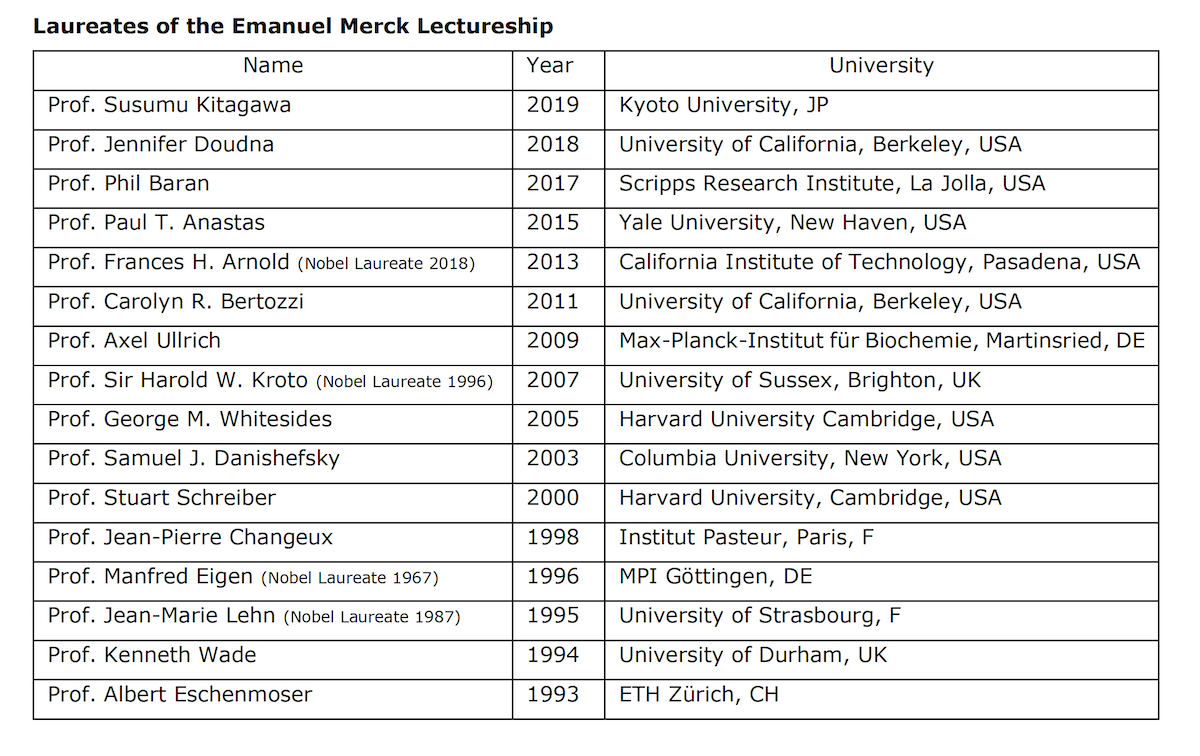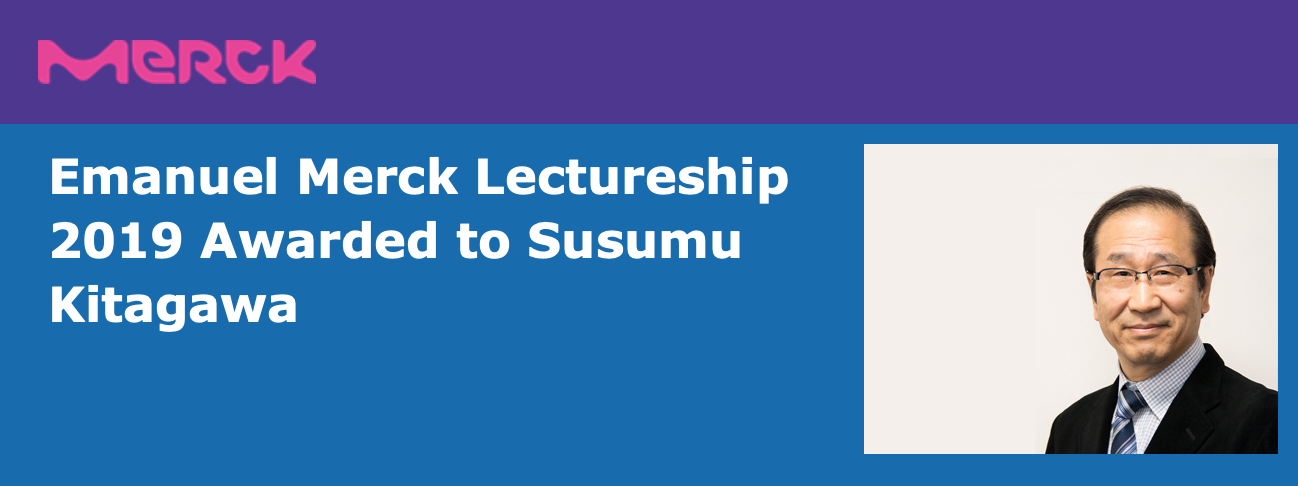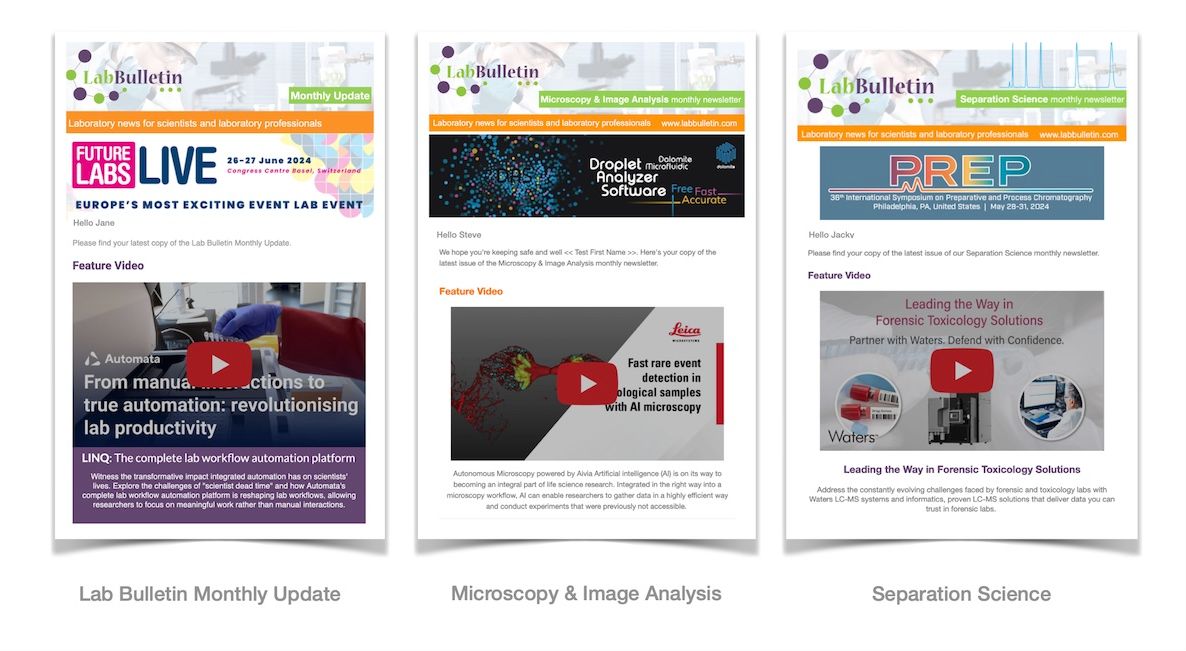Merck Lectureship 2019 Awarded to Susumu Kitagawa
Susumu Kitagawa, Professor at the Institute for Integrated Cell–Material Sciences at Kyoto University, Japan, has been named the sixteenth recipient of the Emanuel Merck Lectureship.
Merck, a leading science and technology company, has announced that Susumu Kitagawa, Professor at the Institute for Integrated Cell–Material Sciences at Kyoto University, Japan, has been named the sixteenth recipient of the Emanuel Merck Lectureship. He is being recognized for his pioneering scientific work in the field of metal organic frameworks (MOFs). His fundamental contributions to the development of this innovative class of nanoporous materials could lead to new ways of capturing, storing and releasing gases. Broadly speaking, MOFs could contribute to improving the state of our planet by helping to fight climate change.
“I am thankful for the honor bestowed upon me today for my work as a scientist,” said Kitagawa on receiving the news about this distinction. “My big dream is to synthesize very important chemicals such as amino acids directly from an ubiquitous element: air. When you think of it, all the elements are right there: oxygen, carbon, nitrogen, but also hydrogen in moisture. I’m not sure I will actually be able to achieve that, but I can encourage young researchers in this direction.”
“We are honoring an outstanding scientist whose contribution to mankind might not be visible to everyone now, but will be sooner or later,” said Klaus Griesar, Head of Science Relations at Merck. “This science prize not only serves to promote scientific exchange with internationally recognized researchers, but it also provides insights into front-line scientific research. It fits in well with Merck as a science and technology company and complements chemical research at the Technische Universität Darmstadt.”
The Emanuel Merck Lectureship was jointly established by Merck and the Technische Universität Darmstadt in 1992. It recognizes globally renowned scientists who have made superb contributions to chemical and pharmaceutical research. From 1993 to the present day, the award has been granted to 16 eminent scientists from all over the world.
The prize, worth € 30,000, will be presented to Kitagawa on May 13, 2019 during a public lecture at the Hörsaal- und Medienzentrum at the Lichtwiese campus of TU Darmstadt. Starting at 5 p.m., the prize winner will hold a lecture entitled “Welcome to Small Spaces - Chemistry and Application of Porous Coordination Polymers /Metal-Organic Frameworks”.
Kitagawa’s development of nanoporous materials could lead to new ways of capturing, storing and releasing gases like in a cage with bars so small as to lock gas molecules inside it. In essence, metal organic frameworks (MOFs) are such cages. They combine metallic knots and organic ligands that hold them together. By combining different types of metals and ligands, the size and shapes of the pores can be controlled, which means MOFs can be used to capture or release gases on a molecular scale. The potential applications are very wide, but certain fields are already quite promising, such as gas storage (typically for methane, hydrogen or CO2), gas separation (which would be useful in the field of air quality, for capturing harmful molecules for example), gas transformation – using the catalytic properties of MOFs – as well as for making high-sensitivity gas sensors. Capturing and re-using gases in these cages could help develop clean technologies to tackle climate change and open up new possibilities in energy storage.
Apart from the Emanuel Merck Lectureship, Merck honors science and scientist with many other awards. The latest addition to this is the Future Insight Prize, which was announced in July 2018 and will be awarded for the first time in July 2019. Merck aims to give up to €1 billion annually for the next 35 years to incentivize people whose work has enabled significant progress towards making this vision a reality by discovering new ground-breaking science or by developing enabling technologies. This year’s prize will be granted for a visionary product to protect humanity from a new pandemic threat.

About Emanuel Merck
Emanuel Merck (1794–1855) was a direct descendant of Merck’s founder Friedrich Jacob Merck, who had received a privilege for a pharmacy—later known as Engel-Apotheke—in Darmstadt in 1668. Emanuel Merck studied pharmacy in Berlin and Vienna. Following his studies, he worked at his father’s pharmacy, and in 1816 he took over its management. In addition to this, he was occupied with research on the chemical constitution of herbal natural materials where he isolated alkaloids and prepared them in a pure state.
In 1827 Emanuel Merck introduced what he called a “Novitäten-Kabinett” (“Cabinet of Novelties”). This contained a list of high-purity alkaloids (such as morphine) that he had isolated independently. It also included a booklet summarizing what was currently known about their chemistry, pharmacology, and information on synthesizing these substances.
Alkaloids tested the limits of an ordinary pharmacist’s capabilities. Although the pharmacopoeias contained information on these substances and how to make them, the finished products were not sufficiently pure, so their therapeutic use still posed a risk. While the only alkaloid that other German manufacturers were mostly producing was quinine, Emanuel Merck was interested in a much broader portfolio. An official report on the General German Industry Exhibition in 1842 observed: “In the unanimous opinion of experts, Merck’s alkaloids surpassed anything produced by similar factories in size and purity.”
This unmatched level of purity, which Emanuel Merck attained in his work with alkaloids, then applied to all substances, became the company’s hallmark as formulated in its famous “Guarantee Policy”.
About Merck
Merck, a leading science and technology company, operates across healthcare, life science and performance materials. Around 52,000 employees work to make a positive difference to millions of people’s lives every day by creating more joyful and sustainable ways to live. From advancing gene editing technologies and discovering unique ways to treat the most challenging diseases to enabling the intelligence of devices – the company is everywhere. In 2018, Merck generated sales of € 14.8 billion in 66 countries.
Scientific exploration and responsible entrepreneurship have been key to Merck’s technological and scientific advances. This is how Merck has thrived since its founding in 1668. The founding family remains the majority owner of the publicly listed company. Merck holds the global rights to the Merck name and brand. The only exceptions are the United States and Canada, where the business sectors of Merck operate as EMD Serono in healthcare, MilliporeSigma in life science, and EMD Performance Materials.

